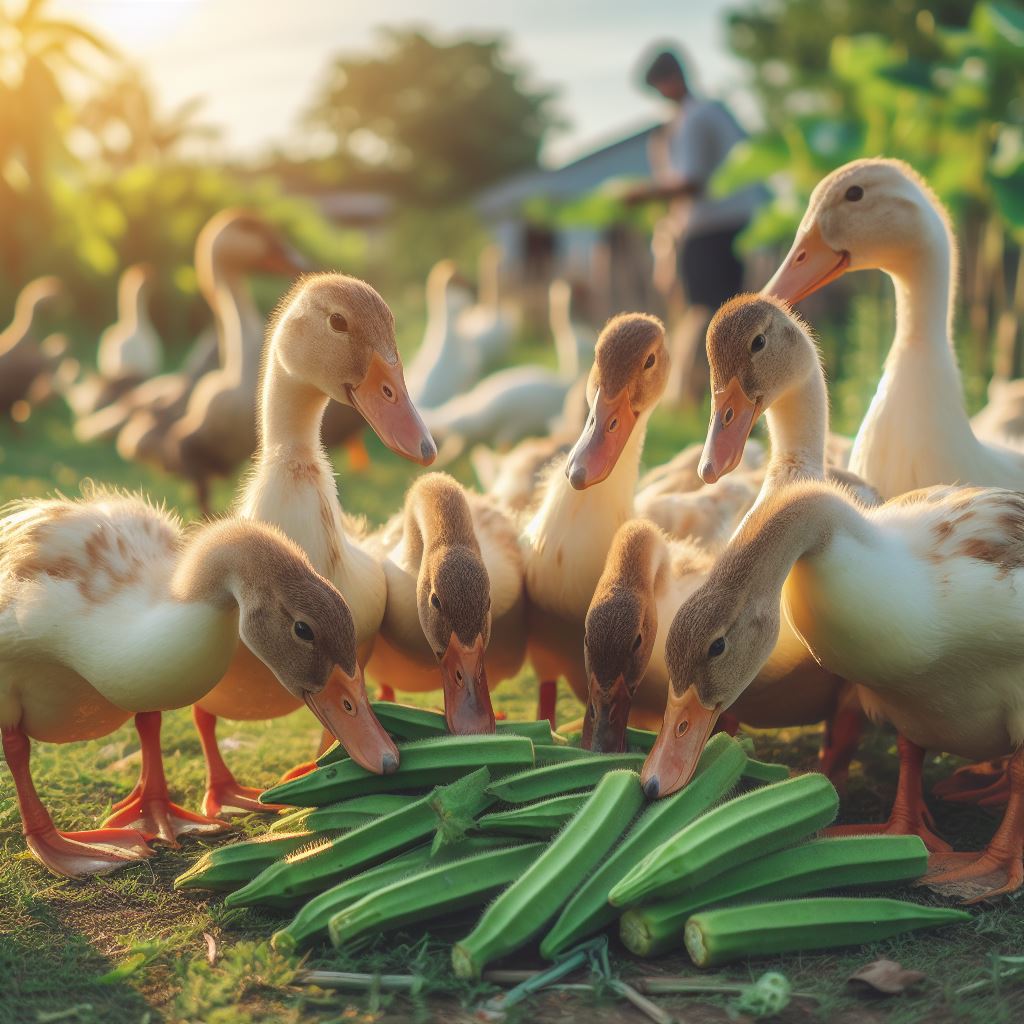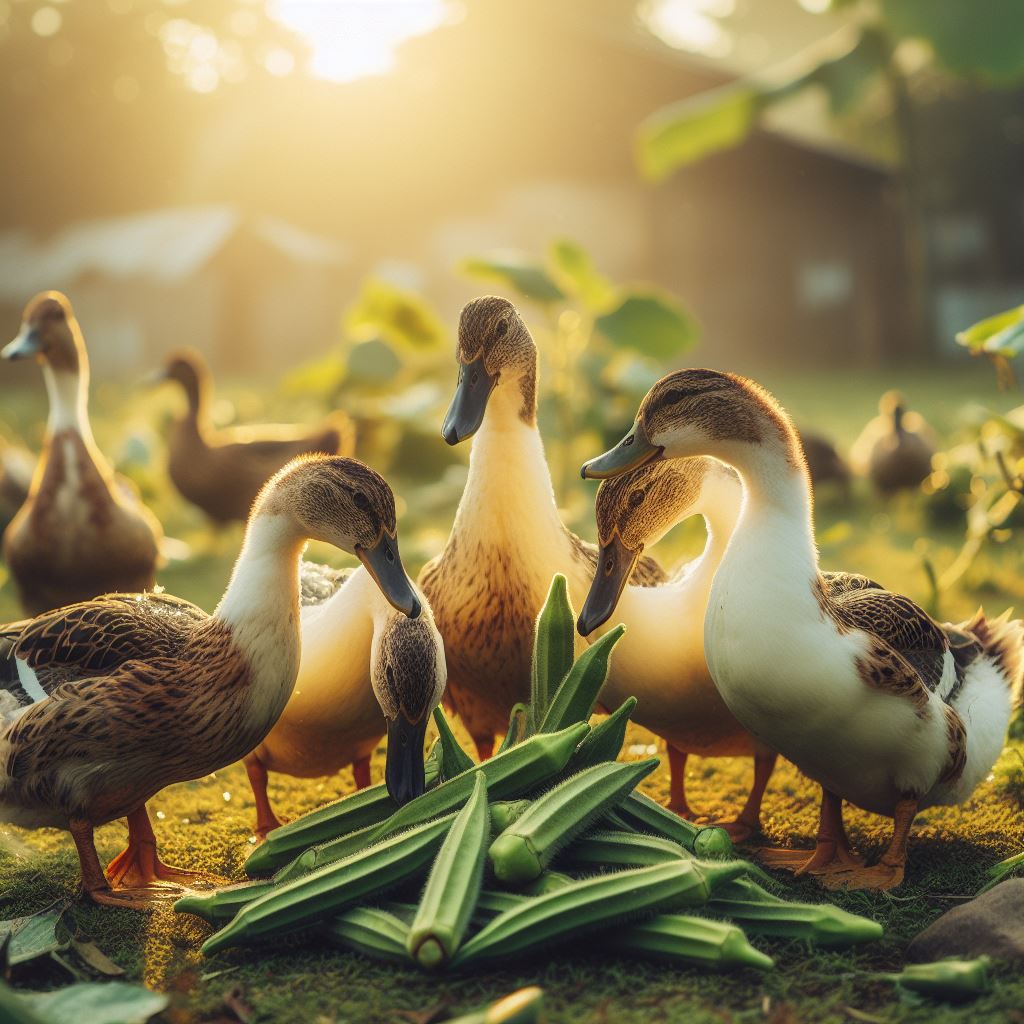Yes, ducks can safely eat okra in moderation.
I recommend incorporating small amounts of okra into their diet on occasion.
Okra provides beneficial nutrients like vitamins A and C, calcium, and potassium.
The pods, seeds, leaves, and flowers of the okra plant are all edible for ducks.
However, okra does contain trace amounts of solanine, so it should not make up a large part of a duck’s diet.
I advise dicing okra pods into bite-sized pieces for easier digestion.
Cooked okra tends to be softer and more palatable as well.
Offer your ducks a few pieces of okra two or three times a week at most, along with their other foods like duck feed, vegetables, fruits, and insects.
Providing dietary variety is key.
Monitor your ducks after initially trying okra to ensure they tolerate it well.
Signs of an upset digestive system include loose droppings, lack of appetite, or lethargy.
Discontinue feeding okra if any irritation occurs.For more detailed information on safely incorporating okra and other human foods into your ducks’ nutritional plan, be sure to check out my full article below.
I cover proper serving sizes, preparation methods, benefits, risks, and more.

- What part of the okra plant can ducks eat - the pods, leaves, stems, flowers or seeds?
- Should okra fed to ducks be raw or cooked first? Does cooking change the nutritional value?
- How much okra is safe to feed ducks? Is there a risk of feeding too much?
- Does okra need to be chopped, sliced or processed in some way before feeding to ducks? What's the easiest way to prepare it for them?
- What nutrients are in okra that make it potentially healthy for ducks? Does it provide anything essential missing from their normal diet?
- Do all types of ducks enjoy eating okra?
- Helping Resources:
What part of the okra plant can ducks eat – the pods, leaves, stems, flowers or seeds?
All parts of the okra plant can be safely consumed by ducks, including the pods, leaves, stems, flowers, and seeds.
However, the pods and leaves tend to be the most commonly fed parts to ducks.The okra pods are the most popular part to feed ducks.
When preparing okra pods for your ducks, be sure to wash them thoroughly, removing any dirt or debris.
You can chop the cleaned pods into smaller pieces to make them easier for the ducks to eat.
Raw, sliced okra pods make a nutritious snack or addition to their feed mix.Okra leaves are also perfectly fine for ducks to eat.
They can graze directly on okra plants in your garden.
Just as with the pods, wash the leaves thoroughly before feeding to remove grit and residue.
Chopped or torn okra leaves can be mixed into duck feed or offered on their own.The stems, flowers, and seeds of the okra plant are all edible for ducks as well.
However, these parts are not typically fed as commonly as the more substantial pods and leaves.
But in moderation, ducks can consume and benefit from all components of the okra plant.
Should okra fed to ducks be raw or cooked first?
Does cooking change the nutritional value?
When it comes to feeding okra to ducks, both raw and cooked okra can be given safely.
However, cooking the okra first can make it easier for the ducks to digest and access some of the nutrients.In my experience caring for ducks, I typically recommend cooking vegetables like okra before feeding them.
The heat from cooking softens the vegetable, breaking down some of the cell structures.
This makes it easier for the duck’s digestive system to extract nutrients and pass the remaining fiber.Cooking does lead to some loss of certain heat-sensitive vitamins like vitamin C.
However, okra is naturally high in vitamin C so even after cooking, it retains useful levels of this nutrient.
Other nutrients like vitamin A, vitamin K, B vitamins, antioxidants, and minerals are fairly stable to cooking.Additionally, cooking okra removes compounds like oxalic acid that can inhibit nutrient absorption.
It also eliminates any bacteria, parasites, or other pathogens that may be present.
This lowers the risk of the ducks getting sick.
How much okra is safe to feed ducks?
Is there a risk of feeding too much?
When it comes to feeding okra to ducks, moderation is key.
Okra can be a healthy part of a duck’s diet, but too much can cause digestive issues.I recommend feeding ducks no more than one small raw okra pod per day.
The okra pods contain the most nutrients and are the safest part to feed.
Avoid giving ducks the leaves or stems which contain higher levels of toxins.
If preparing cooked okra, a few spoonfuls 1-2 times per week is sufficient.The main risk of feeding ducks too much okra is digestive upset and bloating.
Okra contains mucilaginous substances that can be difficult to digest, especially in large amounts.
Additionally, okra contains trace amounts of solanine, a natural toxin.
Consuming high quantities could cause toxicity.By limiting okra to just one small pod per day for raw okra, or 1-2 small servings of cooked okra per week, you can provide your ducks with the nutritional benefits of this vegetable without risking any negative side effects.
Always provide plenty of fresh water as well so their digestive system stays healthy.
With some common sense precautions, okra can be a tasty and nutritious supplement to a duck’s diet.
Does okra need to be chopped, sliced or processed in some way before feeding to ducks?
What’s the easiest way to prepare it for them?
When preparing okra to feed to ducks, it is best to chop or slice it into smaller pieces first.
Feeding the okra to ducks whole and unprocessed can make it difficult for them to eat.The easiest method is to rinse the okra, slice it into rounds about 3/4 to 1 inch thick, and then either mix the raw slices in with their feed or quickly sauté the slices in a little oil or butter.
Sautéing helps soften up the texture, while still retaining nutrients.
Boiling the okra slices for 3-5 minutes is another simple cooking method.I don’t recommend feeding whole, raw okra pods to ducks as they may have trouble biting into it and digesting it properly.
Processing the okra by dicing, slicing, or cooking it slightly breaks down the texture and makes it easier for ducks to eat.
This prevents any digestion issues.
What nutrients are in okra that make it potentially healthy for ducks?Does it provide anything essential missing from their normal diet?
| Nutrient | Function in Ducks |
|---|---|
| Soluble Fiber | Regulates blood sugar and cholesterol levels, aids digestion |
| Protein | Essential for growth, maintenance, and repair of body tissues |
| Vitamins (A, C, K) | Support immune system, vision, blood clotting, bone health, feather growth |
| Calcium | Important for bone health |
| Potassium | Essential for muscle and nerve function, heart health |
| Magnesium | Supports muscle and nerve function, essential for migratory flights and swimming in ducks |
| Folate | Aids in the growth and development of ducks, supports metabolism |
Feeding ducks okra can provide essential nutrients such as soluble fiber, protein, vitamins (A, C, K), calcium, potassium, magnesium, and folate, which support various aspects of their health and well-being.
These nutrients aid in digestion, boost the immune system, promote bone and feather health, and support overall growth and development.

Do all types of ducks enjoy eating okra?
I can provide some insight into ducks and their culinary preferences.In general, most domestic duck breeds enjoy eating fresh vegetables as part of a balanced diet.
Okra can be a healthy treat for ducks due to its high fiber and antioxidant content.
However, taste and preferences do vary quite a bit from duck to duck, even within the same breed.
When offered okra, some ducks will eagerly gobble it up, while others seem indifferent towards it.
I’ve found that Muscovy ducks tend to be especially fond of vegetables.
In my aviaries, the Muscovies will often waddle over quickly whenever I bring over a basket of fresh veggies!
Meanwhile, the smaller Call ducks exhibit more variability – some love plant foods like okra, while others just tolerate it.
Ducklings also tend to be more open to trying new foods like okra.
As they mature, their dietary preferences tend to stabilize more.
So hand-raising ducks with lots of fresh produce exposure early on seems to make them more likely to enjoy those foods later on.
I suggest offering your ducks a small piece of okra to see if they like it.
You can chop it into bite-sized pieces to make it easier for them to eat.
Always be sure to introduce new foods in moderation and have plenty of fresh water available.
Helping Resources:
[1] https://happyfarmyard.com/can-ducks-eat-okra/
[2] https://ducksraising.com/can-ducks-eat-okra/
[3] https://hayfarmguy.com/can-ducks-eat-okra
[4] https://www.latimes.com/recipe/duck-and-okra-gumbo
[5] https://www.alphafoodie.com/how-to-cook-okra/
